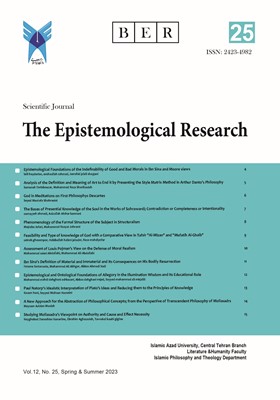-
-
List of Articles
-
Open Access Article
1 - Epistemological Foundations of the Indefinability of Good and Bad Morals in Ibn Sina and Moore views
leili heydarian enshaallah rahmati jamshid jalali sheyjani -
Open Access Article
2 - Analysis of the Definition and Meaning of Art to End it by Presenting the Style Matrix Method in Arthur Danto's Philosophy
Samaneh Tariabouzar Mohammad Reza Sharifzadeh -
Open Access Article
3 - God in Meditations on First Philosophys Descartes
seeyed mostafa shahraeini -
Open Access Article
4 - The Bases of Presential Knowledge of the Soul in the Works of Sohrawardi; Contradiction or Completeness or Intentionality
somayyeh ahmadi Azizolah Afsharkermani -
Open Access Article
5 - Phenomenology of the Formal Structure of the Subject in Structuralism
Mojtaba Jafari Mohammad Raayat Jahromi -
Open Access Article
6 - Feasibility and Type of knowledge of God with a Comparative View in Tafsir "Al-Mizan" and "Mufatih Al-Ghaib"
zeinab ghasempour habibollah halimi jloudar reza mahdiyanfar -
Open Access Article
7 - Assessment of Louis Pojman's View on the Defense of Moral Realism
mohammad saied abdollahi Mohammad Ali Abdollahi -
Open Access Article
8 - Ibn Sina's Definition of Material and Immaterial and Its Consequences on His Bodily Resurrection
fatemeh satarzadeh mohammad Ali Akhgar abas ahmadi saadi -
Open Access Article
9 - Epistemological and Ontological Foundations of Allegory in the Illumination Wisdom and Its Educational Role
mohammad mahdi dehghani ashkezari abbas dehghaninejad sayed mohammad ali mirjalili -
Open Access Article
10 - Paul Natorp’s Idealstic Interpretation of Plato’s Ideas and Reducing them to the Principles of Knowledge
kazem hani Seyyed Mohsen Hosseini -
Open Access Article
11 - A New Approach for the Abstraction of Philosophical Concepts; from the Perspective of Transcendent Philosophy of Mollasadrs
meysam azizian mosleh -
Open Access Article
12 - Studying Mollasadra’s Viewpoint on Authority and Cause and Effect Necessity
Keygobad Daneshian Kananlou Ebrahim Aghazadeh Tavvakol Kouhi gabalo
-
The rights to this website are owned by the Raimag Press Management System.
Copyright © 2021-2025







